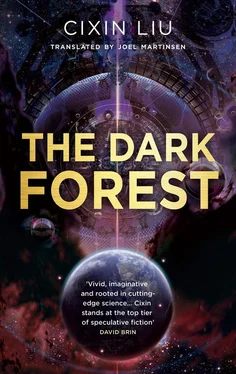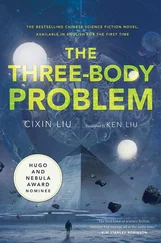“It’s a brush!” shouted the general in alarm.
The layman always comes up with better names than the expert, which is why when experts name things they, too, work from an outsider’s perspective. And thus “brush” became the figure’s name, because the general’s description was accurate: It was a cosmic brush. Or, to be more precise, a set of cosmic bristles without a handle. Of course, you could also see it as hair standing on end.
“It must be a scratch in the coating! I mentioned in the feasibility study that a paste-up lens would cause problems,” Ringier said, shaking his head.
“All the coatings have been through stringent testing. A scratch of this sort wouldn’t happen. And it’s not generated by any other lens flaw, either. We’ve already returned tens of thousands of test images, and it’s never come up before,” said an expert from Zeiss, the lens’s manufacturer.
A hush fell over the control room. They all gathered to stare up at the image on the screen until it got so crowded that some of them called up the image on other terminals. Fitzroy sensed the change in the room’s atmosphere: People who had grown lazy from the fatigue of lengthy tests were anxious now, like they had been hit by a curse that rooted everything in place but their eyes, which grew ever brighter.
“God!” exclaimed several people at the same time.
The frozen formation abruptly turned into excited activity. The snatches of dialogue Fitzroy picked up were a bit too technical for him.
“Any dust around the target’s position? Check it—”
“No need. I completed that item. Observing the absorption of the background stellar radial movement, there’s an absorption peak at two hundred millimeters. It may be a carbon microparticle, F-class density.”
“Any opinions on the effect of high-speed impact?”
“The wake diffuses along the impact axis, but the diffusion scope… Do we have a model of that?”
“Yes. One moment…. Here it is. Impact speed?”
“A hundred times third cosmic velocity.”
“Is it already that high?”
“That’s a conservative figure…. For the impact cross section, use… Right, that’s right. That’s just about it. Just a rough estimate.”
With the experts busy, Ringier stood next to Fitzroy. “General, can you try your best to count the bristles in the brush?”
The general nodded, and then bent over a terminal and began counting.
The computer needed four or five minutes to complete every calculation, but there were a number of errors, so it was half an hour before the results were ready.
“The wake diffuses the dust to a maximum diameter of two hundred forty thousand kilometers, or twice the size of Jupiter,” the astronomer running the mathematical model said.
“That makes sense,” Ringier said. He raised his arms and looked up at the ceiling, as if looking through it to the heavens. “And that confirms it.” There was a tremble to his voice, and then, as if to himself, he said, “So it’s been confirmed. Nothing wrong with that.”
Silence fell over the control room again, heavy and oppressive this time. Fitzroy wanted to ask a question, but at the sight of the solemn, bowed heads, he couldn’t open his mouth. After a while, he heard gentle sobs and saw a young man trying to hide his tears.
“Knock it off, Harris. You’re not the only skeptic here. It’s hard for everyone,” someone said.
The young man, Harris, lifted his teary eyes and said, “I know skepticism is just a way to comfort myself, but I wanted to live out my life in comfort. God, now I’m not even lucky enough for that.”
Silence returned.
At last Ringier remembered Fitzroy. “General, let me explain. The three stars are surrounded by interstellar dust. Previously, a number of bodies moving at high speed crossed that dust, and their high-speed impact with the dust left behind a wake. The wake continued to expand and has now reached a diameter twice that of the planet Jupiter. There are only subtle differences between the wake and the surrounding dust, so they are undetectable at close range. Only here, four light-years away, are they observable.”
“I’ve counted the bristles. There are about a thousand,” General Fitzroy said.
“Of course. That number confirms our intelligence reports. General, we’re looking at the Trisolaran Fleet.”
* * *
Hubble II’s discovery, the final confirmation of the reality of the Trisolaran invasion, extinguished the last of humanity’s fantasies. The descent of a new round of despair, panic, and confusion ushered the human race into life under the Trisolar Crisis. Then the hard times began. With a rocky change of direction, the vehicle of time veered off along a new track.
The only constant in a world of tremendous change is the swift passage of time. Five years passed like a blur.
Distance of the Trisolaran Fleet from the Solar System: 4.20 light-years
Tyler had been jumpy lately. Despite the setbacks, the mosquito swarm plan eventually won PDC approval. Development of the space fighters began, but progress was slow due to a lack of advanced technologies. Humanity continued to improve on the technology of its stone age axes and clubs, inventing chemically propelled rockets. Tyler’s supplemental project, the study of Europa, Ceres, and various comets, was odd enough that some people suspected that he had come up with it purely to add a sense of mystery to the overly direct main plan. However, since it could be incorporated into the mainstream defense program, he was allowed to start working on that as well.
So Tyler had to wait. He went home and, for the first time in his five years as a Wallfacer, led the life of a normal person.
The Wallfacers were subject to increasing scrutiny from the community. Whether they had asked for the role or not, they had been set up in the eyes of the masses as messiah figures. Accordingly, a Wallfacer cult sprang up. No matter how many explanations the UN and PDC issued, legends of their supernatural abilities circulated widely and grew increasingly fanciful. In science fiction movies, they were shown as superheroes, and, in the eyes of many, they were the sole hope for humanity. This gave the Wallfacers an enormous amount of popular and political capital that guaranteed things would go smoothly when they tapped huge amounts of resources.
Luo Ji was the exception. He remained in seclusion, never showing his face. No one knew where he was or what he was doing.
One day, Tyler had a visitor. Like the other Wallfacers, his home was under heavy guard, and all visitors had to pass stringent background checks. But when he first saw the visitor in the living room, he knew that the man would pass through easily, because it was obvious at a glance that he posed no threat to anyone. On this hot day he wore a wrinkled suit, a similarly wrinkled tie, and, more annoyingly, the sort of bowler hat no one wore anymore. He evidently wanted to present a more formal appearance for his visit, since he had probably never attended a formal occasion before. Pale and emaciated, he looked malnourished. His glasses sat heavily on his skinny, pale face, his neck hardly seemed able to support the weight of his head, and his suit looked practically empty, as if it was hanging on a rack. As a politician, Tyler saw at a glance that he belonged to one of those mean social classes whose poverty was more spiritual than material, like Gogol’s petty bureaucrats who, despite their lowly social station, still worry about preserving that status and spend their whole lives engaged in uncreative, exhausting random tasks that they carry out exactingly. In everything they do, they fear making mistakes; with everyone they meet, they fear causing displeasure; and they dare not take the slightest glance through the glass ceiling to a higher plane of society. Tyler detested those people. They were utterly dispensable, and when he thought about how they made up the majority of the world that he wanted to save, it left a bad taste in his mouth.
Читать дальше












